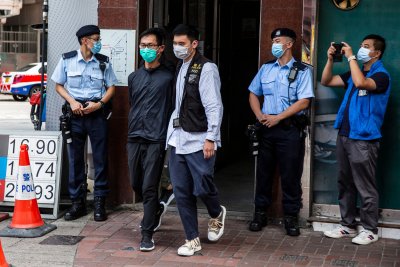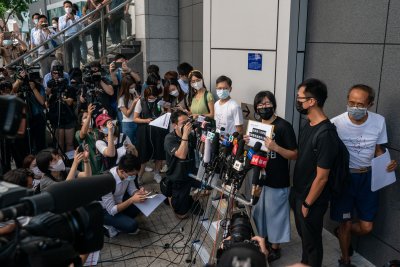The Chinese government lashed out at Secretary of State Antony Blinken and British Foreign Secretary Dominic Raab in separate statements after the two officials tweeted in support of pro-democracy activists who were arrested by Hong Kong police on Wednesday.
Officers with the city's national security unit detained four members of the Hong Kong Alliance—the group organizing the annual Tiananmen vigil—for failing to submit information including membership details and meeting records, the authorities said.
Among those arrested were Hong Kong Alliance Chair Chow Hang-tung, who had been given 14 days to submit the information, according to a notice issued under the sweeping Hong Kong national security law passed by Beijing last summer. The four alliance members were being held at different police stations, the group said in a statement on September 8.
In a tweet on the same day, Blinken called on the Hong Kong authorities to "end ongoing threats against civil society and individuals with differing political viewpoints. Today's arrests of Tiananmen vigil leaders are politically motivated and constitute a blatant abuse of the law by those in power."
A few hours earlier, the U.K.'s Raab also backed the pro-democracy activists, saying: "Today's arrests of members of the Hong Kong Alliance are another chilling demonstration of how the National Security Law is being used by Beijing to dismantle civil society and stifle political dissent in Hong Kong."
China's Foreign Ministry responded through its Hong Kong commissioner's office on Thursday, saying the Hong Kong Alliance had "openly defied the law and refused to comply with the information request of the Hong Kong police."
"The Commissioner's Office firmly supports the Hong Kong police in carrying out their duties in accordance with law to prevent, stop and punish acts endangering national security," the statement said, describing the legislation as "a deterrent to anti-China, destabilizing forces in Hong Kong and foreign interference."
"The national security law distinguishes right from wrong and shall not be vilified," the office said, accusing America's own national security legislation of being more extensive in its reach. "It is not qualified to point fingers at others," its statement read.
U.K. Accused of Political Interference
China's response to the British foreign secretary included similar charges of political interference. The office said it "strongly disapproved and firmly opposed the tweet by Dominic Raab."
"That is gross interference into Hong Kong affairs and China's internal affairs at large," the office added. "Those who cross red lines will be punished by the law. No one is above the law."
The Chinese government claims the national security law is a stabilizing force in the city following pro-democracy demonstrations. Its Foreign Ministry noted: "Anyone who truly supports the rule of law in Hong Kong and hopes for prosperity and stability of the city will applaud the national security law."
"Hong Kong is part of China and Hong Kong affairs are China's internal affairs," the statement concluded. "China urges some politicians to immediately stop supporting anti-China, destabilizing forces in Hong Kong, stop interfering in Hong Kong affairs and its rule of law, and stop meddling with China's internal affairs in any form."
The ministry warned of a "firm counterattack by the Chinese people."
The Hong Kong Alliance in Support of Patriotic Democratic Movements of China was founded in May 1989 as the Tiananmen Square student protests took place in Beijing. It had held vigils for the Tiananmen massacre every year until the Hong Kong government banned public gatherings in the last two years, citing public health concerns.



Correction 9/17/21: This article was updated to correct the spelling of Antony Blinken.
Uncommon Knowledge
Newsweek is committed to challenging conventional wisdom and finding connections in the search for common ground.
Newsweek is committed to challenging conventional wisdom and finding connections in the search for common ground.
About the writer
John Feng is Newsweek's contributing editor for Asia based in Taichung, Taiwan. His focus is on East Asian politics. He ... Read more
To read how Newsweek uses AI as a newsroom tool, Click here.








